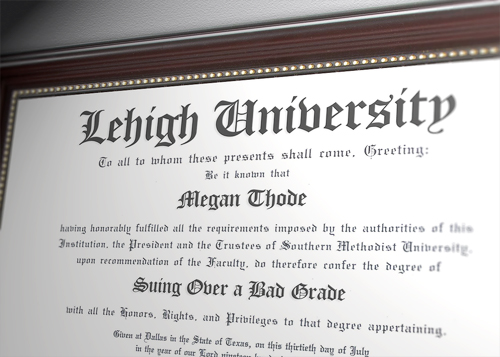Everyone says grades are important, but they’re hardly a good measure of your intelligence and common sense. In fact, a better measure of your common sense might be whether you know when to let things go.
An ‘F’ in common sense

Everyone says grades are important, but they’re hardly a good measure of your intelligence and common sense. In fact, a better measure of your common sense might be whether you know when to let things go.
And that was one area where a Lehigh University student failed to measure up.
Megan Thode graduated from Lehigh with a master’s degree in human development. She’d performed well in all her classes but one: a simple fieldwork course. She received a C+ grade in this class, which prevented her from advancing in a certificate program in her field of study.
For many students, a C+ is a bummer, but not a game-changer. Thode, however, took it as a personal affront and an attempt to ruin her career. So when the school refused to change the grade after making an inquiry at her request, she saw fit to seek legal representation.
You read that right: She was so upset over her C+ that she sued her school.
She didn’t sue for a grade change, though. She sued for potential loss of earnings as a result of not being able to complete the certificate that she’d planned to obtain along with her degree. Thode sought damages to the tune of $1.3 million, claiming a personal vendetta and discrimination against her views on lesbian, gay, bisexual and transgender rights led her professor to conspire to ruin her career.
Unsurprisingly, she lost the lawsuit.
But that’s hardly all she lost. In suing her school over a triviality, Thode could easily have jeopardized her future earning potential far more than not obtaining a certificate ever could. She created a lasting record that shows she’s unable to leave well enough alone.
Hasty and poorly considered litigation is the sign of an immature and irresponsible person—especially in Thode’s case. Her defense? Her performance in the class merited a higher grade than she received, and because her school failed to remedy it, she wound up with lesser earnings potential than she’d planned.
Court documents give the reason she received low marks: participation. The professor defended the C+ by providing examples of poor class behavior, including instigating fights and using profanity without good reason.
A simple transcript wouldn’t have given employers this information. By bringing it into a courtroom, she ensured that all prospective employers would be privy to her mistakes in graduate school.
Lawsuits in academia tend to end badly. Not only do they become public record for future employers, but current employers can see lawsuits as a potential hazard of keeping a person on staff. Although it isn’t entirely warranted, it can cause companies to worry about people suing them over trivial things.
If your history makes a company worry you could sue them, they might not be as keen to keep you. Unofficially, of course.
Additionally, if Thode elects to continue her education and pursue a doctoral degree, she may face difficulties getting into a program. After all, any school she applies to could see her court history, including statements made by professors she’d worked with for months—if not years—that discussed her behavior, potential and maturity level.
And all that after they see the fact that she sued over a C+.
Finally, there’s the fact that she had to pay a lawyer to represent her in court. That’s not a small fee. And it might not be all she pays if the school or one of the professors chooses to file against her for harassment (one of the professors may have a case) or for slander, though the likelihood of this is low.
Did I mention she attended her graduate program completely free of charge? She was actually paid to go to school, and she still thought they ruined her financially. (Honestly, I can’t hear her argument over all my student loans’ caterwauling.)
Lawsuits are difficult and shouldn’t be entered into lightly. Thode showed poor judgment in suing her school, and it’s likely she’ll suffer deleterious effects on her career as a result. For current students, however, it could at least be a cautionary tale.
Grades are important, but don’t risk your career over them.





